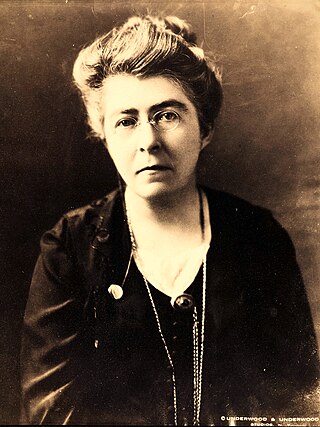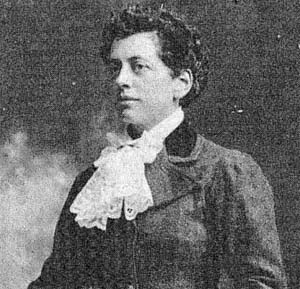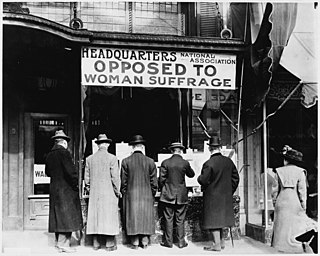Related Research Articles

Johanna Mary Sheehy-Skeffington was a suffragette and Irish nationalist. Along with her husband Francis Sheehy-Skeffington, Margaret Cousins and James Cousins, she founded the Irish Women's Franchise League in 1908 with the aim of obtaining women's voting rights. She was later a founding member of the Irish Women Workers' Union. Her son Owen Sheehy-Skeffington became a politician and Irish senator.

The Women's Freedom League was an organisation in the United Kingdom from 1907 to 1961 which campaigned for women's suffrage, pacifism and sexual equality. It was founded by former members of the Women's Social and Political Union after the Pankhursts decided to rule without democratic support from their members.

Charlotte Despard was an Anglo-Irish suffragist, socialist, pacifist, Sinn Féin activist, and novelist. She was a founding member of the Women's Freedom League, the Women's Peace Crusade, and the Irish Women's Franchise League, and an activist in a wide range of political organizations over the course of her life, including among others the Women's Social and Political Union, Humanitarian League, Labour Party, Cumann na mBan, and the Communist Party of Great Britain.

A movement to fight for women's right to vote in the United Kingdom finally succeeded through acts of Parliament in 1918 and 1928. It became a national movement in the Victorian era. Women were not explicitly banned from voting in Great Britain until the Reform Act 1832 and the Municipal Corporations Act 1835. In 1872 the fight for women's suffrage became a national movement with the formation of the National Society for Women's Suffrage and later the more influential National Union of Women's Suffrage Societies (NUWSS). As well as in England, women's suffrage movements in Wales, Scotland and other parts of the United Kingdom gained momentum. The movements shifted sentiments in favour of woman suffrage by 1906. It was at this point that the militant campaign began with the formation of the Women's Social and Political Union (WSPU).

Mary Teresa Hayden was an Irish historian, Irish-language activist and campaigner for women's causes.

A suffragette was a member of an activist women's organisation in the early 20th century who, under the banner "Votes for Women", fought for the right to vote in public elections in the United Kingdom. The term refers in particular to members of the British Women's Social and Political Union (WSPU), a women-only movement founded in 1903 by Emmeline Pankhurst, which engaged in direct action and civil disobedience. In 1906, a reporter writing in the Daily Mail coined the term suffragette for the WSPU, derived from suffragistα, in order to belittle the women advocating women's suffrage. The militants embraced the new name, even adopting it for use as the title of the newspaper published by the WSPU.

Anna Maria Haslam was a suffragist and a major figure in the 19th and early 20th century women's movement in Ireland.

The Irish Women's Franchise League was an organisation for women's suffrage which was set up in Dublin in November 1908. Its founder members included Hanna Sheehy-Skeffington, Margaret Cousins, Francis Sheehy-Skeffington and James H. Cousins. Thomas MacDonagh was a member.
The Dublin Women's Suffrage Association (DSWA), later the Irish Women's Suffrage and Local Government Association (IWSLGA), was a women's suffrage organisation based in Dublin from 1876 to 1919, latterly also campaigning for a greater role for women in local government and public affairs.
St. Joan's International Alliance is a non profit women's organization. St. Joan's is a feminist Catholic organization, with a focus on women's equality. It is named after St. Joan of Arc. The organization has played a major role in influencing the ordination of women and general human rights. Their mission is "to secure the political, social and economic equality between men and women and to further the work and usefulness of Catholic women as citizens".

Helen Miller Fraser, later Moyes, was a Scottish suffragist, feminist, educationalist and Liberal Party politician who later emigrated to Australia.

Women's suffrage in Wales has historically been marginalised due to the prominence of societies and political groups in England which led the reform for women throughout the United Kingdom. Due to differing social structures and a heavily industrialised working-class society, the growth of a national movement in Wales grew but then stuttered in the late nineteenth century in comparison with that of England. Nevertheless, distinct Welsh groups and individuals rose to prominence and were vocal in the rise of suffrage in Wales and the rest of Great Britain.

The National Association Opposed to Women Suffrage (NAOWS) was founded in the United States by women opposed to the suffrage movement in 1911. It was the most popular anti-suffrage organization in northeastern cities. NAOWS had influential local chapters in many states, including Texas and Virginia.

Hannah Winbolt (1851–1928) was a prominent advocate for women's suffrage, giving speeches across the United Kingdom on the subject of women's rights from her perspective of a working woman. Known for being an effective orator, she was one of four women honoured retrospectively by Stockport Metropolitan Borough Council, in the naming of Suffragette Square, Stockport.
Jessie Cunningham Methven was a Scottish campaigner for women's suffrage. She was honorary secretary of the Edinburgh National Society for Women's Suffrage from the mid 1890s until 1906. In that role, She corresponded regularly with national and local newspapers across Scotland on the subject of women's suffrage. She subsequently joined the more militant Women's Social and Political Union and described herself as an "independent socialist". Methven took part in suffragette protests and was arrested for breaking windows in London in 1911. She wrote an article for The Suffragette newspaper, the weekly newspaper of the WSPU, entitled Women's Suffrage in the Past, A Record of Betrayal which reflected on the history of the women's suffrage movement in Britain.

Meg Connery was an Irish suffragist from Westport, County Mayo. Known for her wit and bravery, she was a prominent member of the Irish Women's Franchise League (IWFL) and participated in several demonstrations advocating for women's suffrage. Notably, in 1911, she was imprisoned for a week, and in 1912, she heckled Winston Churchill and broke windows in public protests to draw attention to the cause. Connery was arrested multiple times, and in 1913 she led a hunger strike while imprisoned for window-breaking at Dublin Castle.

Lillian Margaret Metge was an Anglo-Irish suffragette and women's rights campaigner. She founded the Lisburn Suffrage Society, which she left to become a militant activist, leading on an explosion at the Anglican Lisburn Cathedral in Ireland. She was imprisoned briefly, and awarded a Women's Social and Political Union Hunger Strike medal. She continued her campaign, albeit peacefully, during and after World War I.

Lolita Roy, also known as Mrs. P. L. Roy, was an Indian social reformer and suffragist who played an active role in the social life of Indians in London, as well as in campaigns for women's suffrage in Britain and India. She was described in The Vote in 1911 as 'one of the most emancipated of Indian women'.
References
- 1 2 3 4 5 6 7 8 9 Luddy, Maria (1995). Women in Ireland, 1800-1918: A Documentary History. Cork, Ireland: Irish Writers' Centre. ISBN 9781859180389 . Retrieved 8 May 2016.
- ↑ Tomás A. O’Riordan. "Suffragette". Movements for Political & Social Reform. University College, Cork. Archived from the original on 16 March 2013. Retrieved 21 May 2013.
- ↑ Pašeta, Senia (2013). Irish Nationalist Women: 1900-1918. Cambridge: Cambridge University Publishing. ISBN 9781107047747.